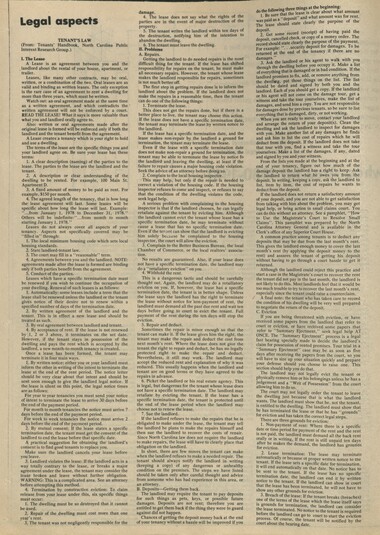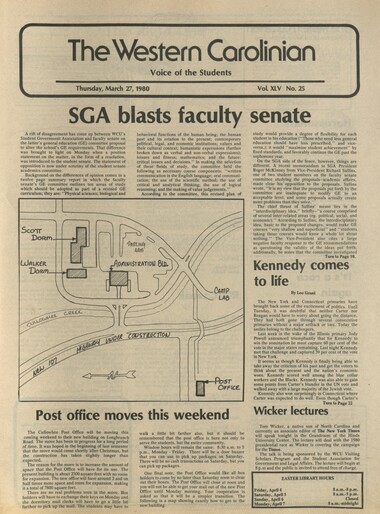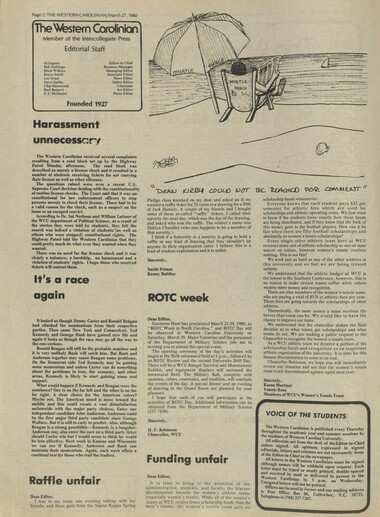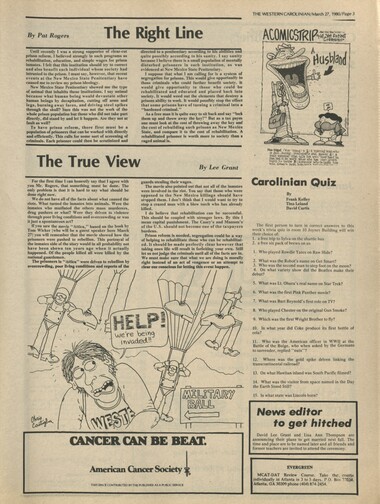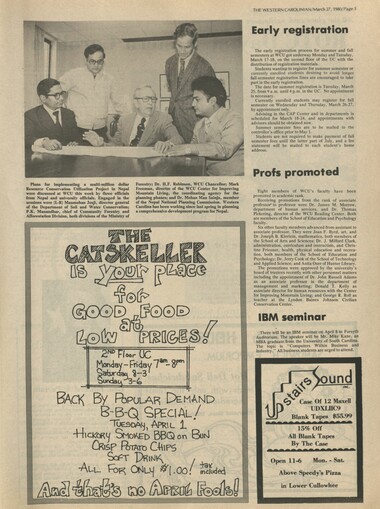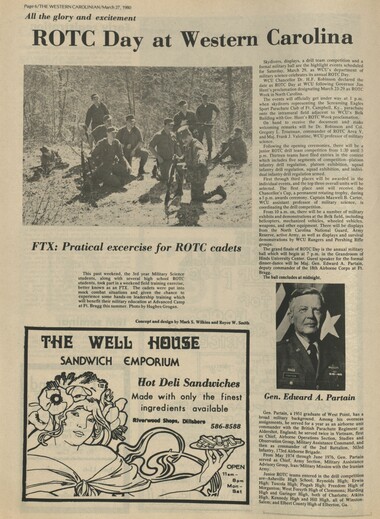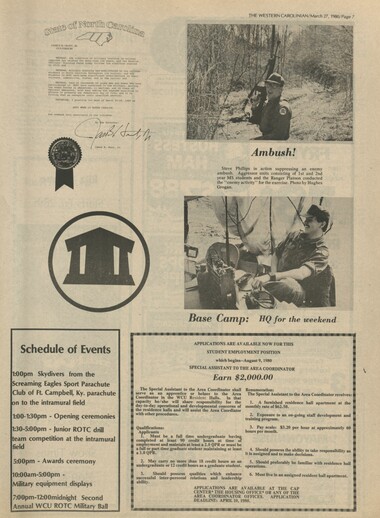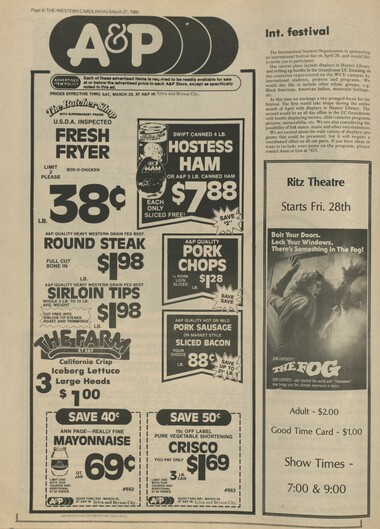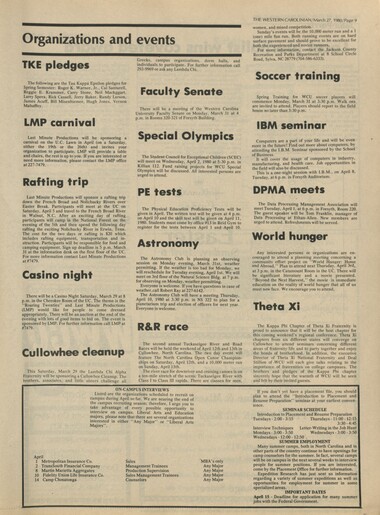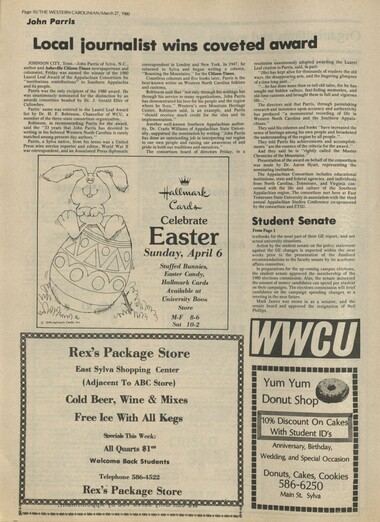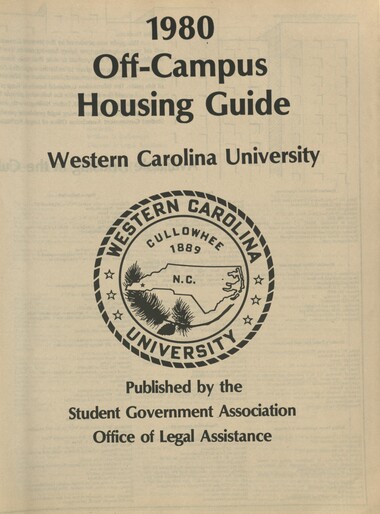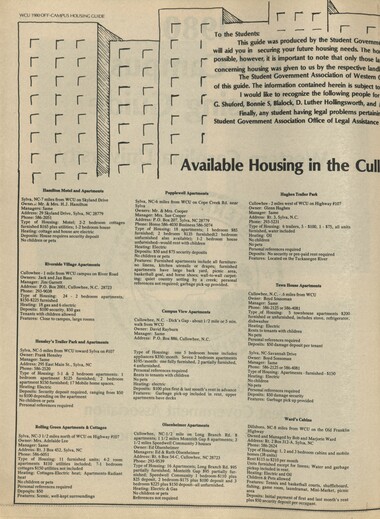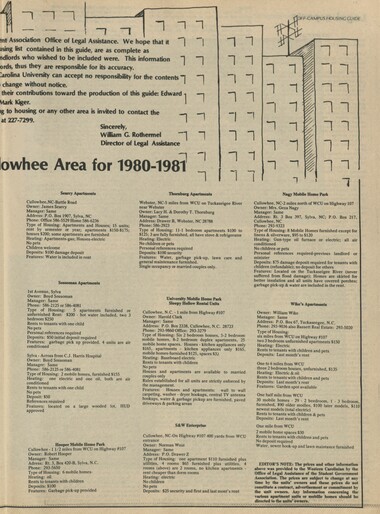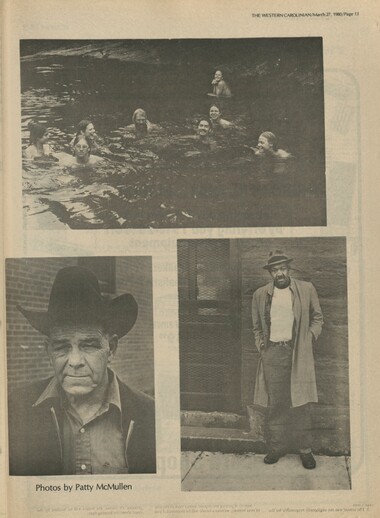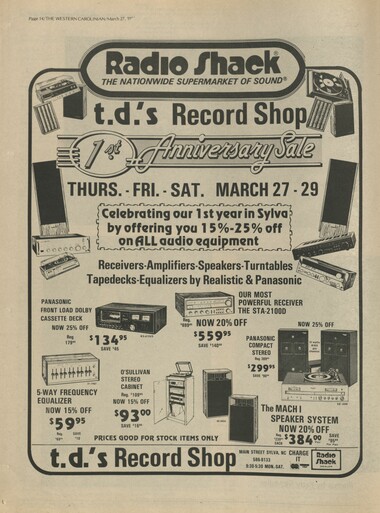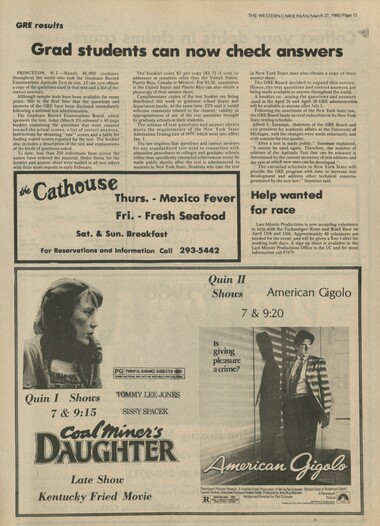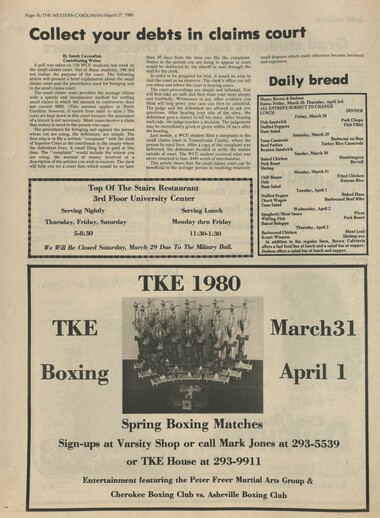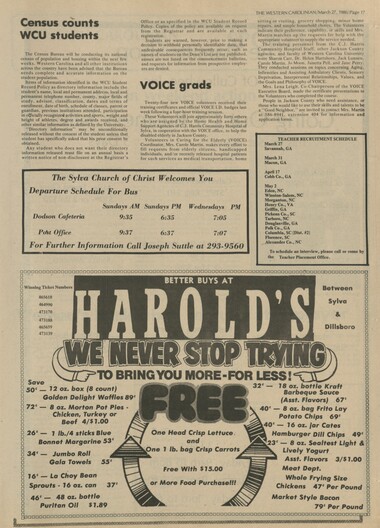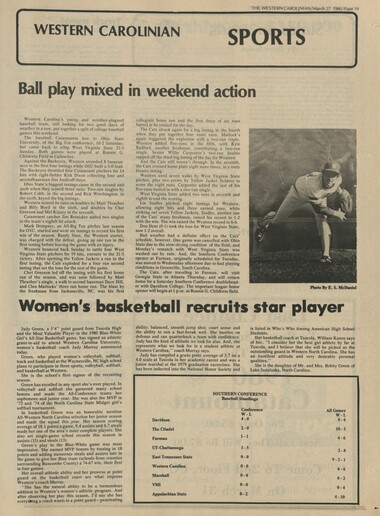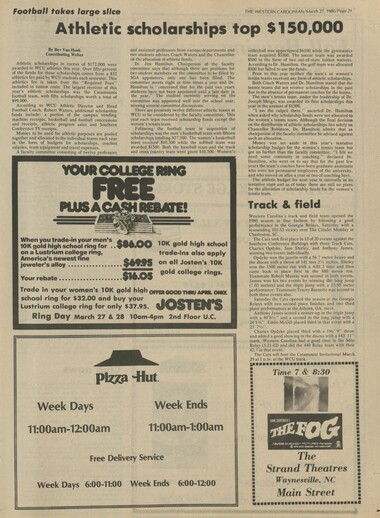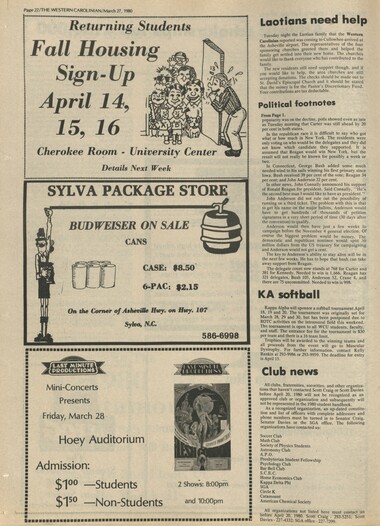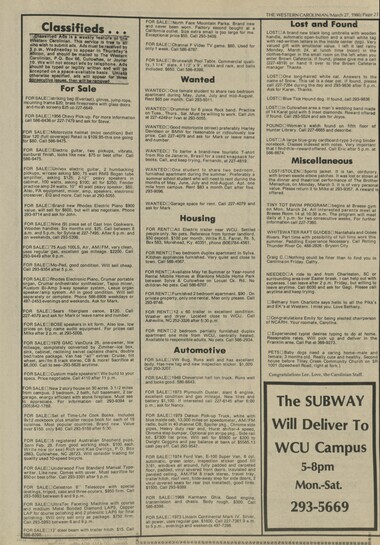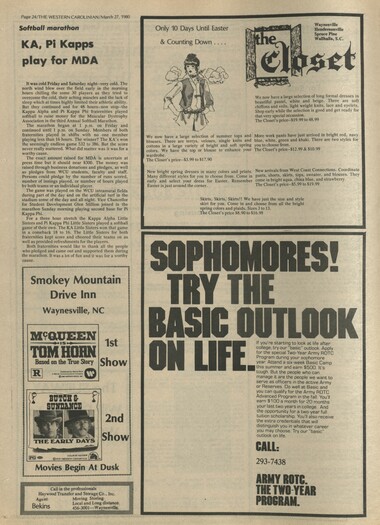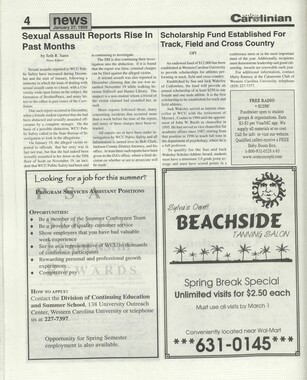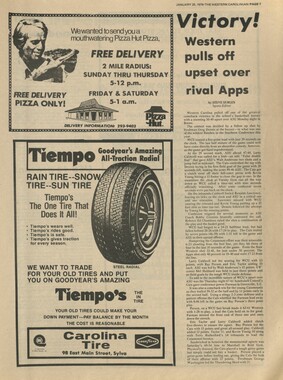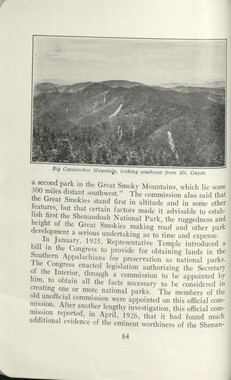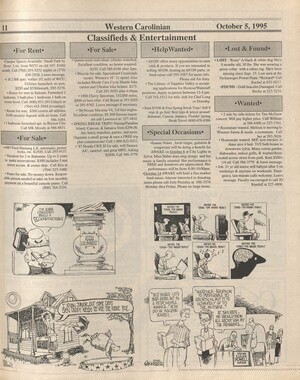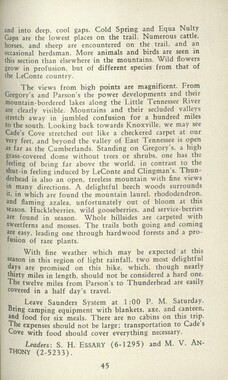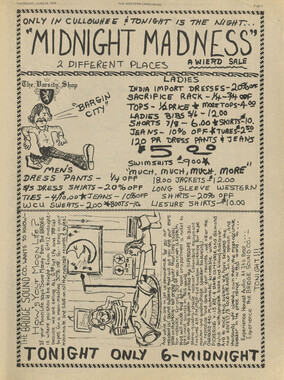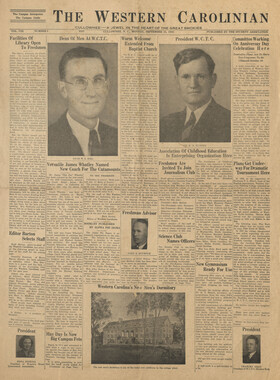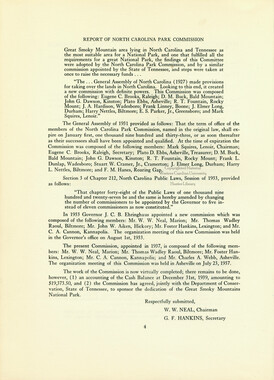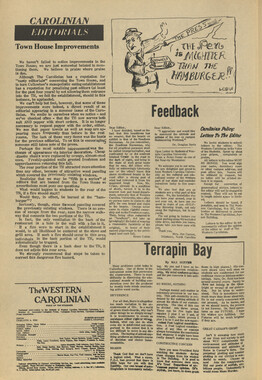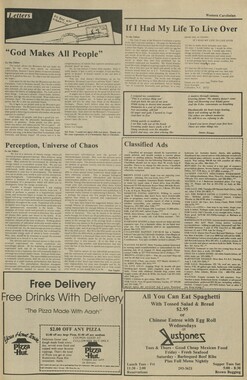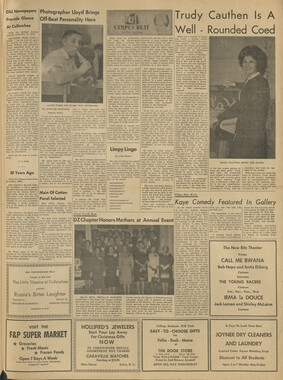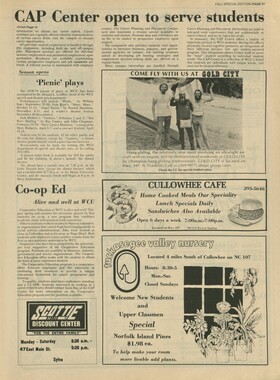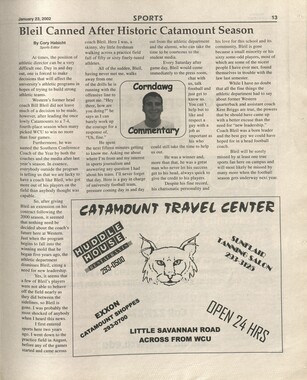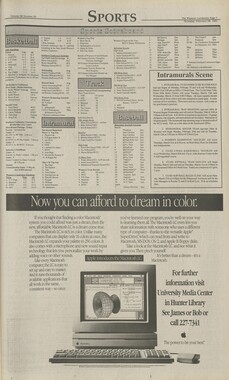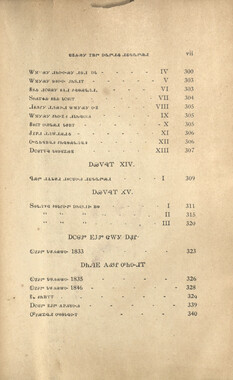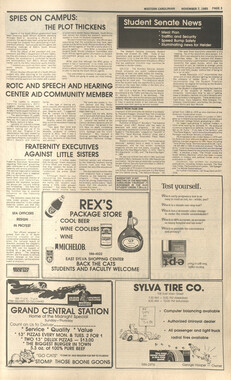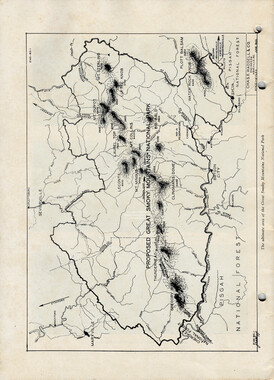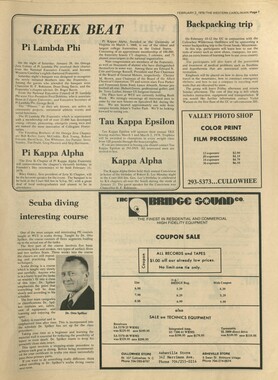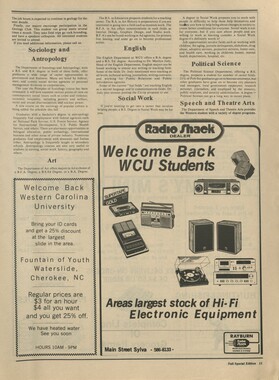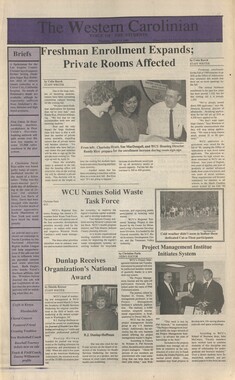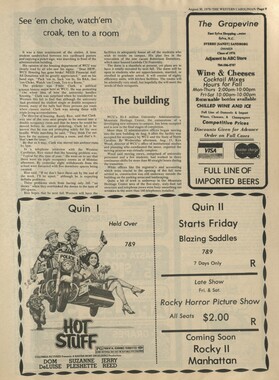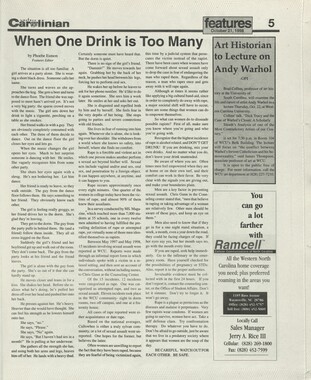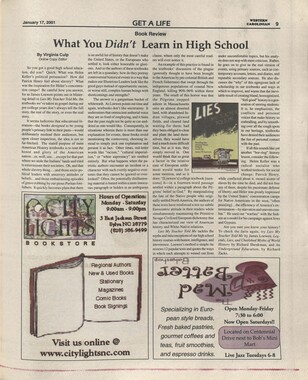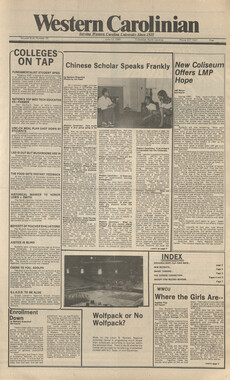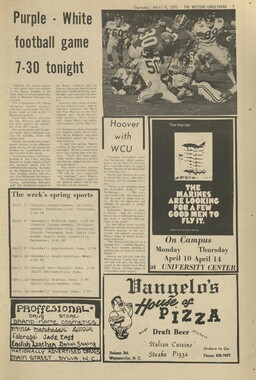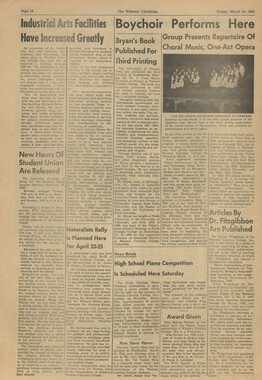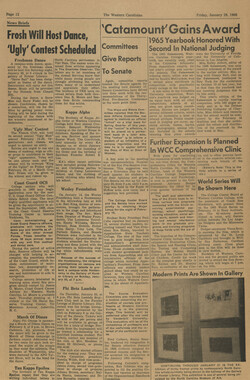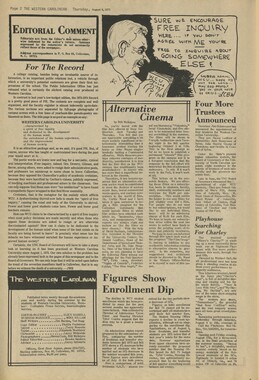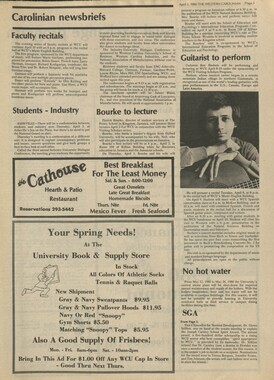Western Carolina University (20)
View all
- Canton Champion Fibre Company (2308)
- Cherokee Traditions (292)
- Civil War in Southern Appalachia (165)
- Craft Revival (1942)
- Great Smoky Mountains - A Park for America (2766)
- Highlights from Western Carolina University (430)
- Horace Kephart (941)
- Journeys Through Jackson (154)
- LGBTQIA+ Archive of Jackson County (85)
- Oral Histories of Western North Carolina (314)
- Picturing Appalachia (6772)
- Stories of Mountain Folk (413)
- Travel Western North Carolina (160)
- Western Carolina University Fine Art Museum Vitreograph Collection (129)
- Western Carolina University Herbarium (92)
- Western Carolina University: Making Memories (708)
- Western Carolina University Publications (2283)
- Western Carolina University Restricted Electronic Theses and Dissertations (146)
- Western North Carolina Regional Maps (71)
- World War II in Southern Appalachia (131)
University of North Carolina Asheville (6)
View all
- Western Carolina College (199)
- Western Carolina Teachers College (239)
- Western Carolina University (1792)
- Allanstand Cottage Industries (0)
- Appalachian National Park Association (0)
- Bennett, Kelly, 1890-1974 (0)
- Berry, Walter (0)
- Brasstown Carvers (0)
- Cain, Doreyl Ammons (0)
- Carver, George Washington, 1864?-1943 (0)
- Cathey, Joseph, 1803-1874 (0)
- Champion Fibre Company (0)
- Champion Paper and Fibre Company (0)
- Cherokee Indian Fair Association (0)
- Cherokee Language Program (0)
- Crittenden, Lorraine (0)
- Crowe, Amanda (0)
- Edmonston, Thomas Benton, 1842-1907 (0)
- Ensley, A. L. (Abraham Lincoln), 1865-1948 (0)
- Fromer, Irving Rhodes, 1913-1994 (0)
- George Butz (BFS 1907) (0)
- Goodrich, Frances Louisa (0)
- Grant, George Alexander, 1891-1964 (0)
- Heard, Marian Gladys (0)
- Kephart, Calvin, 1883-1969 (0)
- Kephart, Horace, 1862-1931 (0)
- Kephart, Laura, 1862-1954 (0)
- Laney, Gideon Thomas, 1889-1976 (0)
- Masa, George, 1881-1933 (0)
- McElhinney, William Julian, 1896-1953 (0)
- Niggli, Josephina, 1910-1983 (0)
- North Carolina Park Commission (0)
- Osborne, Kezia Stradley (0)
- Owens, Samuel Robert, 1918-1995 (0)
- Penland Weavers and Potters (0)
- Rhodes, Judy (0)
- Roberts, Vivienne (0)
- Roth, Albert, 1890-1974 (0)
- Schenck, Carl Alwin, 1868-1955 (0)
- Sherrill's Photography Studio (0)
- Smith, Edward Clark (0)
- Southern Highland Handicraft Guild (0)
- Southern Highlanders, Inc. (0)
- Stalcup, Jesse Bryson (0)
- Stearns, I. K. (0)
- Thompson, James Edward, 1880-1976 (0)
- United States. Indian Arts and Crafts Board (0)
- USFS (0)
- Vance, Zebulon Baird, 1830-1894 (0)
- Weaver, Zebulon, 1872-1948 (0)
- Western Carolina University. Mountain Heritage Center (0)
- Whitman, Walt, 1819-1892 (0)
- Wilburn, Hiram Coleman, 1880-1967 (0)
- Williams, Isadora (0)
- 1920s (57)
- 1930s (69)
- 1940s (114)
- 1950s (66)
- 1960s (314)
- 1970s (599)
- 1980s (406)
- 1990s (379)
- 2000s (195)
- 2010s (83)
- 1600s (0)
- 1700s (0)
- 1800s (0)
- 1810s (0)
- 1820s (0)
- 1830s (0)
- 1840s (0)
- 1850s (0)
- 1860s (0)
- 1870s (0)
- 1880s (0)
- 1890s (0)
- 1900s (0)
- 1910s (0)
- 2020s (0)
- Jackson County (N.C.) (2282)
- Appalachian Region, Southern (0)
- Asheville (N.C.) (0)
- Avery County (N.C.) (0)
- Blount County (Tenn.) (0)
- Buncombe County (N.C.) (0)
- Cherokee County (N.C.) (0)
- Clay County (N.C.) (0)
- Graham County (N.C.) (0)
- Great Smoky Mountains National Park (N.C. and Tenn.) (0)
- Haywood County (N.C.) (0)
- Henderson County (N.C.) (0)
- Knox County (Tenn.) (0)
- Knoxville (Tenn.) (0)
- Lake Santeetlah (N.C.) (0)
- Macon County (N.C.) (0)
- Madison County (N.C.) (0)
- McDowell County (N.C.) (0)
- Mitchell County (N.C.) (0)
- Polk County (N.C.) (0)
- Qualla Boundary (0)
- Rutherford County (N.C.) (0)
- Swain County (N.C.) (0)
- Transylvania County (N.C.) (0)
- Watauga County (N.C.) (0)
- Waynesville (N.C.) (0)
- Yancey County (N.C.) (0)
- Newsletters (510)
- Publications (documents) (1773)
- Aerial Photographs (0)
- Aerial Views (0)
- Albums (books) (0)
- Articles (0)
- Artifacts (object Genre) (0)
- Bibliographies (0)
- Biography (general Genre) (0)
- Cards (information Artifacts) (0)
- Clippings (information Artifacts) (0)
- Crafts (art Genres) (0)
- Depictions (visual Works) (0)
- Design Drawings (0)
- Drawings (visual Works) (0)
- Envelopes (0)
- Facsimiles (reproductions) (0)
- Fiction (general Genre) (0)
- Financial Records (0)
- Fliers (printed Matter) (0)
- Glass Plate Negatives (0)
- Guidebooks (0)
- Internegatives (0)
- Interviews (0)
- Land Surveys (0)
- Letters (correspondence) (0)
- Manuscripts (documents) (0)
- Maps (documents) (0)
- Memorandums (0)
- Minutes (administrative Records) (0)
- Negatives (photographs) (0)
- Newspapers (0)
- Occupation Currency (0)
- Paintings (visual Works) (0)
- Pen And Ink Drawings (0)
- Periodicals (0)
- Personal Narratives (0)
- Photographs (0)
- Plans (maps) (0)
- Poetry (0)
- Portraits (0)
- Postcards (0)
- Programs (documents) (0)
- Questionnaires (0)
- Scrapbooks (0)
- Sheet Music (0)
- Slides (photographs) (0)
- Songs (musical Compositions) (0)
- Sound Recordings (0)
- Specimens (0)
- Speeches (documents) (0)
- Text Messages (0)
- Tintypes (photographs) (0)
- Transcripts (0)
- Video Recordings (physical Artifacts) (0)
- Vitreographs (0)
- The Reporter, Western Carolina University (510)
- WCU Students Newspapers Collection (1744)
- A.L. Ensley Collection (0)
- Appalachian Industrial School Records (0)
- Appalachian National Park Association Records (0)
- Axley-Meroney Collection (0)
- Bayard Wootten Photograph Collection (0)
- Bethel Rural Community Organization Collection (0)
- Blumer Collection (0)
- C.W. Slagle Collection (0)
- Canton Area Historical Museum (0)
- Carlos C. Campbell Collection (0)
- Cataloochee History Project (0)
- Cherokee Studies Collection (0)
- Daisy Dame Photograph Album (0)
- Daniel Boone VI Collection (0)
- Doris Ulmann Photograph Collection (0)
- Elizabeth H. Lasley Collection (0)
- Elizabeth Woolworth Szold Fleharty Collection (0)
- Frank Fry Collection (0)
- George Masa Collection (0)
- Gideon Laney Collection (0)
- Hazel Scarborough Collection (0)
- Hiram C. Wilburn Papers (0)
- Historic Photographs Collection (0)
- Horace Kephart Collection (0)
- Humbard Collection (0)
- Hunter and Weaver Families Collection (0)
- I. D. Blumenthal Collection (0)
- Isadora Williams Collection (0)
- Jesse Bryson Stalcup Collection (0)
- Jim Thompson Collection (0)
- John B. Battle Collection (0)
- John C. Campbell Folk School Records (0)
- John Parris Collection (0)
- Judaculla Rock project (0)
- Kelly Bennett Collection (0)
- Love Family Papers (0)
- Major Wiley Parris Civil War Letters (0)
- Map Collection (0)
- McFee-Misemer Civil War Letters (0)
- Mountain Heritage Center Collection (0)
- Norburn - Robertson - Thomson Families Collection (0)
- Pauline Hood Collection (0)
- Pre-Guild Collection (0)
- Qualla Arts and Crafts Mutual Collection (0)
- R.A. Romanes Collection (0)
- Rosser H. Taylor Collection (0)
- Samuel Robert Owens Collection (0)
- Sara Madison Collection (0)
- Sherrill Studio Photo Collection (0)
- Smoky Mountains Hiking Club Collection (0)
- Stories of Mountain Folk - Radio Programs (0)
- Venoy and Elizabeth Reed Collection (0)
- WCU Gender and Sexuality Oral History Project (0)
- WCU Mountain Heritage Center Oral Histories (0)
- WCU Oral History Collection - Mountain People, Mountain Lives (0)
- Western North Carolina Tomorrow Black Oral History Project (0)
- William Williams Stringfield Collection (0)
- Zebulon Weaver Collection (0)
- College student newspapers and periodicals (1769)
- African Americans (0)
- Appalachian Trail (0)
- Artisans (0)
- Cherokee art (0)
- Cherokee artists -- North Carolina (0)
- Cherokee language (0)
- Cherokee pottery (0)
- Cherokee women (0)
- Church buildings (0)
- Civilian Conservation Corps (U.S.) (0)
- Dams (0)
- Dance (0)
- Education (0)
- Floods (0)
- Folk music (0)
- Forced removal, 1813-1903 (0)
- Forest conservation (0)
- Forests and forestry (0)
- Gender nonconformity (0)
- Great Smoky Mountains National Park (N.C. and Tenn.) (0)
- Hunting (0)
- Landscape photography (0)
- Logging (0)
- Maps (0)
- Mines and mineral resources (0)
- North Carolina -- Maps (0)
- Paper industry (0)
- Postcards (0)
- Pottery (0)
- Railroad trains (0)
- Rural electrification -- North Carolina, Western (0)
- School integration -- Southern States (0)
- Segregation -- North Carolina, Western (0)
- Slavery (0)
- Sports (0)
- Storytelling (0)
- Waterfalls -- Great Smoky Mountains (N.C. and Tenn.) (0)
- Weaving -- Appalachian Region, Southern (0)
- Wood-carving -- Appalachian Region, Southern (0)
- World War, 1939-1945 (0)
- Text (2283)
- MovingImage (0)
- Sound (0)
- StillImage (0)
Western Carolinian Volume 45 Number 25
Item
Item’s are ‘child’ level descriptions to ‘parent’ objects, (e.g. one page of a whole book).
-
-
Legal aspects TENANT'S LAW (From: Tenants' Handbook, North Carolina Public Interest Research Group.) 1. The Lease A Lease is an agreement between you and the landlord about the rental of your house, apartment, or trailer. Leases, like many other contracts, may be oral, written, or a combination of the two. Oral leases are as valid and binding as written leases. The only exception is the rare case of an agreement to rent a dwelling for more than three years, which must be written. Watch out: an oral agreement made at the same time as a written agreement, and which contradicts the ' written agreement will not be enforced by a court. READ THE LEASE! What it says is more valuable than what you and landlord orally agree to. Also: written or oral agreements made after the original lease is formed will be enforced only if both the landlord and the tenant benefit from the agreement. A Lease creates a tenancy which is your right to hold and use a dwelling. The terms of the lease are the specific things you and your landlord agree on. Be sure your lease has these terms: 1. A clear description (naming) of the parties to the lease. The parties to the lease are the landlord and the tenant. 2. A description or clear understanding of the dwelling to be rented. For example, 100 Main St. Apartment D. 3. A fixed amount of money to be paid as rent. For example, $150 per month. 4. The agreed length of the tenancy, that is how long the lease agreement will last. Some leases will be specific about how long the lease will last. Example: "...from January 1, 1978 to December 31, 1978." Others will be indefinite:"...from month to month starting January 1, 1978." Leases do not always cover all aspects of your tenancy. Aspects not specifically covered may be "filled in" through: 1. The local minimum housing code which sets local housing standards. 2. State landlord-tenant law. 3. The court may fill in a "reasonable" term. 4. Agreements between you and the landlord. NOTE: agreements made after the lease is formed are binding only if both parties benefit from the agreement. 5. Conduct of the parties. Leases which have a specific termination date must be renewed if you wish to continue the occupation of your dwelling. Renewal of such leases is as follows: 1. Automatically: some leases include a term that the lease shall be renewed unless the landlord or the tenant gives notice of their desire not to renew within a specified number of days of the termination date. 2. By written agreement of the landlord and the tenant. This is in effect a new lease and should be treated as such. 3. By oral agreement between landlord and tenant. 4. By acceptance of rent. If the lease is not renewed by 1, 2 or 3 above, it terminates on the set date. However, if the tenant stays in possession of the dwelling and pays the rent which is accepted by the landlord, a new month-to-month tenancy is created. Once a lease has been formed, the tenant may terminate it in four main ways. 1. By written notice: either you or your landlord must inform the other in writing of the intent to terminate the lease at the end of the rent period. The notice letter should be very clear about that intent and should be sent soon enough to give the landlord legal notice. If the lease is silent on this point, the legal notice times are as follows: For year to year tenancies you must send your notice of intent to terminate the lease to arrive 30 days before the end of the payment period. For month to month tenancies the notice must arrive 7 days before the end of the payment period. For week to week tenancies the notice must arrive 2 days before the end of the payment period. 2. By mutual consent: If the lease states a specific termination date, the tenant must get the consent of the landlord to end the lease before that specific date. A practical suggestion for obtaining the landlord's consent is to find good tenants to replace you. Make sure the landlord cancels your lease before you leave. 3. Landlord violates the lease: If the landlord acts in a way totally contrary to the lease, or breaks a major agreement under the lease, the tenant may consider the lease broken and leave without further obligation. WARNING: This is a complicated area. See an attorney before attempting this method. 4. Termination by constructive eviction: To claim release from your lease under this, six specific things must occur: 1. The dwelling must be so destroyed that it cannot be used. 2. Repair of the dwelling must cost more than one year's rent. 3. The tenant was not negligently responsible for the damage. 4. The lease does not say what the rights of the parties are in the event of major destruction of the property. 5. The tenant writes the landlord within ten days of the destruction, notifying him of the intention to abandon the dwelling. 6. The tenant must leave the dwelling. II. Problems A. Repairs. Getting the landlord to do needed repairs is the most difficult thing for the tenant. If the lease has shifted responsibility for repairs on the tenant, he must make all necessary repairs. However, the tenant whose lease makes the landlord responsible for repairs, sometimes is not much better off. The first step in getting repairs done is to inform the landlord about the problem. If the landlord does not make the repairs in a reasonable time, then the tenant can do one of the following things: 1. Terminate the lease. This does not get the repairs done, but if there is a better place to live, the tenant may choose this action. If the lease does not have a specific termination date, the tenant may terminate the lease by written notice to the landlord. If the lease has a specific termination date, and the lease makes non-repair by the landlord a ground for termination, the tenant may terminate the lease. Even if the lease with a specific termination date does not make non-repair a ground for termination, the tenant may be able to terminate the lease by notice fo the landlord and leaving the dwelling, at least if the failure to repair causes a major housing code violation. Seek the advice of an attorney before doing so. 2. Complain to the local housing inspector. This may help, but only if the repair is needed to correct a violation of the housing code. If the housing inspector refuses to come and inspect, or refuses to say that the condition of the dwelling violates the code, seek legal help. A serious problem with complaining to the housing inspector is that if the landlord chooses, he can legally retaliate against the tenant by evicting him. Although the landlord cannot evict the tenant whose lease has a specific termination date, he may terminate without cause a lease that has no specific termination date. Even if the tenant can show that the landlord is evicting him solely because he complained to the housing inspector, the court will allow the eviction. 3. Complain to the Better Business Bureau, the local Chamber of Commerce, or the local realtors' association. No results are guaranteed. Also, if your lease does not have a specific termination date, the landlord may do a "retaliatory eviction" on you. 4. Withhold the rent. This is a dangerous tactic and should be carefully thought out. Again, the landlord may do a retailiatory eviction on you. If, however, the lease has a specific termination date, the tenant is in better shape. Unless the lease says the landlord has the right to terminate the lease without notice for "non-payment of rent, the landlord must demand all the past due rent and wait ten days before going to court to evict the tenant. Full payment of the rent during the ten days will stop the eviction. 5. Repair and deduct. Sometimes the repair is minor enough so that the tenant can make it. If the lease gives him the right, the tenant may make the repair and deduct the cost from next month's rent. Where the lease does not give the tenant the right to repair and deduct, he has no legally protected right to make the repair and deduct. Nevertheless, it still may work. The landlord may accept the reduced rent and explanation of why it was reduced. This usually happens when the landlord and tenant are on good terms or they have agreed to the repairs in advance. 6. Picket the landlord or his real estate agency. This is legal, but dangerous for the tenant whose lease does not have a specific termination date. The landlord may retaliate by evicting the tenant. If the lease has a specific termination date, the tenant is protected until the end of the lease period when the landlord may choose not to renew the lease. 7. Sue the landlord. If the landlord refuses to make the repairs that he is obligated to make under the lease, the tenant may tell the landlord he plans to make the repairs himself and then sue the landlord to recover the costs of reoair. Since North Carolina law does not require the landlord to make repairs, the lease will have to clearly place that obligation on the landlord. In short, there are few moves the tenant can make when the landlord refuses to make a needed repair. The tenant should always notify the landlord in writing (keeping a copy) of any dangerous or unhealthy condition on the premises. The steps we have listed should be taken only after careful thought and advice from someone who has had experience in this area, or an attorney. B. Deposits—Getting them back. The landlord may require the tenant to pay deposits for such things as pets, keys, or possible future damages. Deposits are not rent; therefore you are entitled to get them back if the thing they were to guard against did not happen. Chances of getting the deposit money back at the end of your tenancy without a hassle will be improved if you foilownngthreetmngsatt^b^nning: *,*LWsu^rh.tUrhTte^ris clear about what amount 1. Be sure u a what amount was for rent SC'.hoSlSt. clearly the purpose of the de2P°Get some record (receipt) of having paid the deposit, cancelled check, or copy of a money order. The record should state clearly the purpose of the payment. For example: "• . .security deposit for damages. To be returned at the end of the tenancy if there are no darAsk the landlord or his agent to walk with you through the dwelling before you occupy it Make a hst of everything that is damaged or in bad condition. If the landlord promises to fix, add, or remove anything from the dwelling, put those things on the list. The list should be dated and signed by both you and the landlord Each of you should get a copy. If the landlord or his agent will not come on the damage tour, get a witness and take the tour yourselves, make the list of damages, and send him a copy. You are not responsible for damages done by previous tenants, so be sure to list everything that is damaged, dirty, or not working. When you are ready to move, contact your landlord and arrange the return of your deposit(s). Clean the dwelling and ask the landlord to inspect for damages with you. Make another list of any damages he finds and ask him to list the cost of repairs which he will deduct from the deposit. If the landlord does not take that tour with you, find a witness and take the tour yourselves. Make a list of the damages, if any, dated and signed by you and your witness. From the lists you made at the beginning and at the end of your tenancy, figure out how much of the damage deposit the landlord has a right to keep. Ask the landlord to return what he owes you from the deposit. In writing, keeping a copy, ask the landlord to list, item by item, the cost of repairs he wants to deduct from the deposit. If the landlord does not return a satisfactory amount of your deposit, and you are not able to get satisfaction from talking with him about the problem, you may get legal help, or bring action in small claims court. You can do this without an attorney. See a pamphlet, "How to Use the Magistrate's Court to Resolve Small Claims". This pamphlet was prepared by the North Carolina Attorney General and is available in the Clerk's office of any Superior Court House. A common practice among tenants is to deduct any deposits that may be due from the last month's rent. This gives the landlord enough money to cover the last month's rent (by applying the deposit money to the rent) and assures the tenant of getting his deposit without having to go through a court hassle to get it returned. Although the landlord could reject this practice and start a case in the Magistrate's court to recover the rent the tenant did not pay in the last month, the landlord is not likely to do this. Most landlords feel that it would be too much trouble to try to recover the last month's rent, especially since the tenant could raise a counterclaim. A final note: the tenant who has taken care to record the condition of his dwelling will be very well prepared to negotiate the return of the deposit. C. Eviction If you are being threatened with eviction, or have received some papers from the landlord that refer to court or eviction, or have received some papers that refer to "Summary Ejectment," seek legal help AT ONCE. The "Summary Ejectment" process is a legal fast hearing specially made to decide the landlord's claim for possession of rented premises. Your trial in a "Summary Ejectment" case may be as soon as five days after receiving the papers from the court, so you will have to size up your situation quickly and prepare your defense should you choose to raise one. This section should help you do that. The landlord may not legally evict the tenant or physically remove him or his belongings unless he has a judgement and a "Writ of Possession" from the court allowing him to do so. The court may not legally order the tenant to leave the dwelling just because that is what the landlord wants. The landlord must show that he, not the tenant, is entitled to the dwelling. The landlord must show that he has terminated the lease or that he has "grounds" for eviction and has taken the correct legal steps. There are three grounds for eviction: 1. Non-payment of rent: Where there is a specific date or time period for payment of the rent and the rent is not paid, the landlord must demand all the back rent orally or in writing. If the rent is still unpaid ten days after he makes the demand, the landlord has grounds for eviction. 2. Lease termination: The lease may terminate automatically or because ot proper written notice to the tenant. If the lease sets a specific date for termination, it will end automatically on that date. No notice has to be sent to the tenant. If the lease has no specific termination date, the landlord can end it by written H0tIClt0,the tVtmt- If the landlord can show in court that the lease has been terminated, he will not have to show any other grounds for eviction. 3. Breach of the lease: If the tenant breaks (breaches) one of the terms of the lease which the lease itself says is grounds for termination, the landlord can consider the lease terminated. No notice to the tenant is required before the landlord can go to court to start the eviction process. Of course, the tenant will be notified by the court about the hearing date.
Object
Object’s are ‘parent’ level descriptions to ‘children’ items, (e.g. a book with pages).
-
The Western Carolinian is Western Carolina University's student-run newspaper. The paper was published as the Cullowhee Yodel from 1924 to 1931 before changing its name to The Western Carolinian in 1933.
-
